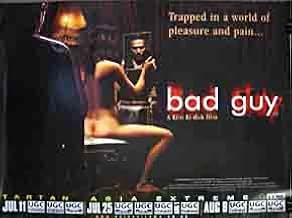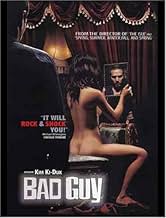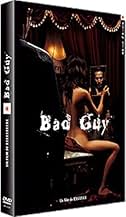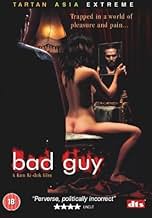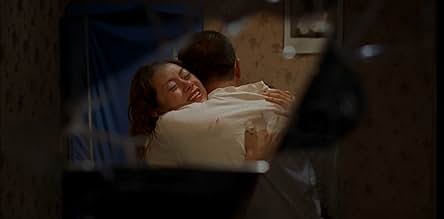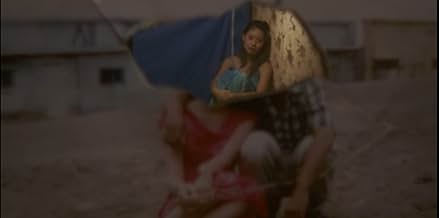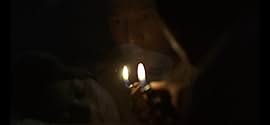Nappeun namja
- 2001
- Tous publics
- 1h 40min
NOTE IMDb
6,6/10
11 k
MA NOTE
Ajouter une intrigue dans votre langueAn unfeeling gangster seeks to ruin the life of a young girl who rejected him. He forces her into prostitution and spies on her regularly, then he soon begins to fall for her.An unfeeling gangster seeks to ruin the life of a young girl who rejected him. He forces her into prostitution and spies on her regularly, then he soon begins to fall for her.An unfeeling gangster seeks to ruin the life of a young girl who rejected him. He forces her into prostitution and spies on her regularly, then he soon begins to fall for her.
- Réalisation
- Scénario
- Casting principal
- Récompenses
- 4 victoires et 3 nominations au total
Kim Yun-tae
- Yun-tae
- (as Yun-tae Kim)
Kim Jeong-yeong
- Eun-hye
- (as Kim Jung-young)
Min Nam-koong
- Hyun-su
- (as Gung-Min Nam)
Avis à la une
"Bad Guy (Nabbeun namja)" is an earlier film of Ki-duk Kim that is probably being released now in the U.S. due to the success of "Spring, Summer, Fall, Winter... and Spring (Bom yeoreum gaeul gyeoul geurigo bom)," but fans of that visually entrancing parable should be warned how very different this exploration of the depths of human nature is.
The style has some similarity in that there is no exposition and we have to connect images that tell a tale of two very different people over time. Context is everything as voyeurism keeps repeating along a sexual spectrum of men and women together -- to romantic or erotic or degrading or lustful or violent, full of obsession or love or hate or longing or disgust, whether in prostitution, a relationship, or rape.
A key context is emotions and degrees, whether by the man or woman, or mutual, or drained of feeling such that I'm not sure love has any meaning in this film. There's a recurring use of Egon Schiele's erotic art to make some kind of comparative point about a continuum of sexual images and their effect on the viewer.
The titular character is reminiscent of Quasimodo of "The Hunchback of Notre Dame" fixating on Esmeralda if he were a psychopathic pimp in, I presume, Seoul's lurid red light district and played by the charismatic Jae-hyeon Jo, like an apolitical "Romper Stomper." I did get a little lost where he fit into the hierarchy of the yakuza-like gangster organization that controls the district, how much authority he has, and who was on top of whom to interpret their obsessions. Some of the encounters we see are presumably his limited fantasies as he miraculously recovers from various violently noble efforts to protect and reach out to the object of his affection that reminded me of the ambiguous ending of Jane Campion's "The Piano."
The film explores some of the same territory as the work of Catherine Breillat, but the context seems uneasily different when I'm the only woman in the theater and the director is male, perhaps because the central woman is always an object, even as she pitifully adapts to her various degradations, and even resists being freed from them. All the women in the film treat each other like the men treat them.
The style has some similarity in that there is no exposition and we have to connect images that tell a tale of two very different people over time. Context is everything as voyeurism keeps repeating along a sexual spectrum of men and women together -- to romantic or erotic or degrading or lustful or violent, full of obsession or love or hate or longing or disgust, whether in prostitution, a relationship, or rape.
A key context is emotions and degrees, whether by the man or woman, or mutual, or drained of feeling such that I'm not sure love has any meaning in this film. There's a recurring use of Egon Schiele's erotic art to make some kind of comparative point about a continuum of sexual images and their effect on the viewer.
The titular character is reminiscent of Quasimodo of "The Hunchback of Notre Dame" fixating on Esmeralda if he were a psychopathic pimp in, I presume, Seoul's lurid red light district and played by the charismatic Jae-hyeon Jo, like an apolitical "Romper Stomper." I did get a little lost where he fit into the hierarchy of the yakuza-like gangster organization that controls the district, how much authority he has, and who was on top of whom to interpret their obsessions. Some of the encounters we see are presumably his limited fantasies as he miraculously recovers from various violently noble efforts to protect and reach out to the object of his affection that reminded me of the ambiguous ending of Jane Campion's "The Piano."
The film explores some of the same territory as the work of Catherine Breillat, but the context seems uneasily different when I'm the only woman in the theater and the director is male, perhaps because the central woman is always an object, even as she pitifully adapts to her various degradations, and even resists being freed from them. All the women in the film treat each other like the men treat them.
Another gem from Kim-Ki-Duk, very complex movie in terms of concept and screenplay. Even hard to digest, what is right, what is wrong...lines are blurred.
You'd like to hate the character of Han-Ki very much but you'll be forced to like him. Evoked a mixture of emotions in me...its brutal in its sense, sensual in its sense...a totally different grammar for emotions...
Once again, Kim-Ki-Duk beautifully used silence in the movie and the main character (as usual??) is silent for major part of the movie. This is not everyone's cup-of-tea, so beware if you are thinking of watching it...you may find it bad
You'd like to hate the character of Han-Ki very much but you'll be forced to like him. Evoked a mixture of emotions in me...its brutal in its sense, sensual in its sense...a totally different grammar for emotions...
Once again, Kim-Ki-Duk beautifully used silence in the movie and the main character (as usual??) is silent for major part of the movie. This is not everyone's cup-of-tea, so beware if you are thinking of watching it...you may find it bad
In Seoul, and in every other major South Korean city, there are red light districts. Few local folks will admit to their existence. But Kim Ki Duk does. And he does even more. He shows us how they work, how innocent young women get trapped by the "business," how a sense of helplessness descends upon the prostitutes, and how painfully unwelcome and irrelevant their boyfriends, their husbands, their families, become.
To make a film with these themes central may not seem like a winning decision. However, this is award-winning director Kim's territory, and he does with the subject matter what he will. No, it's not pretty, so don't expect it to be. No, it doesn't end up with everything working out happily, because life rarely does, so don't expect that either. No, there is no fine, pat conclusion, because Kim knows better.
I noticed that this film contains bits of celluloid that was picked up off the cutting room floor after Kim's renowned "3-Iron" was made. Expect some unexpected scenes in this regard. Unfortunately, the film is ugly from the beginning, with an innocent young woman (the magnificent actress and Kim favorite Seo Won), taken into prostitution against her will through unlikely circumstance. She is not a willing prostitute and she rebels throughout the plot, much to her dismay. But Kim is so adept at this. Ugliness becomes beautiful, noise turns to stillness, the guilty transform to innocence and the truly innocent remain so. I gasp at such awesome presentation. From Kim, we expect this. Still, he can overdo it. Why, I ask, does Kim always place a woman in mortal peril? Is this a must for his stories, his fables? If so, what is he trying to teach us? Certainly, I hope, more than the fact that "sexploitation" exists in his home country.
"Bad Guy" is a beautiful movie, but I only grant it 7 of 10 because Kim has apparently become obsessed with sexual violence (reference "The Isle," "Coast Guard" and "Address Unknown"). Also, there is just too much emphasis placed on predictable fight scenes. Sure, such scenes can serve a purpose, but by 2002, Kim should know he doesn't need to resort to the horrific presentations he makes them. I appreciate what he is trying to accomplish: a counterpoint to his truly beautiful scenes. But do we really need to be hit over the head with sexual brutality again and again? Perhaps his own culture does and, like what Mean Streets and Taxi Driver offered America in the 70's, Kim is trying to do something similar for South Korean society in the 2000 oughts. We can but hope.
Kim takes risks in showing the world the dark underbelly of contemporary Korean culture. He is to be commended for that. But he is capable of presenting so much more, and that is precisely what this film lacks. Kim needs to stop using shock as his stock in trade, and return to his more sublime talents, such as presenting unlikely heroes and heroines. Most of his viewers are, I am sure, quite over blatant scenes of sex and violence. "We get it, Mr. Kim, thank you, offer us something more. We know you can. Make those scenes MEAN something. That is what made you attractive in the first place; do not forget it."
Quickly, as an aside, if anyone supposes, simply because of the similarity of titles, that "Bad Guy" is similar to "Old Boy" by Park Chan Wook, forget it. These two films are nothing alike, except that they are both good.
This film is just good (not great) and should be received by Kim Ki Duk fans with mixed reactions.
To make a film with these themes central may not seem like a winning decision. However, this is award-winning director Kim's territory, and he does with the subject matter what he will. No, it's not pretty, so don't expect it to be. No, it doesn't end up with everything working out happily, because life rarely does, so don't expect that either. No, there is no fine, pat conclusion, because Kim knows better.
I noticed that this film contains bits of celluloid that was picked up off the cutting room floor after Kim's renowned "3-Iron" was made. Expect some unexpected scenes in this regard. Unfortunately, the film is ugly from the beginning, with an innocent young woman (the magnificent actress and Kim favorite Seo Won), taken into prostitution against her will through unlikely circumstance. She is not a willing prostitute and she rebels throughout the plot, much to her dismay. But Kim is so adept at this. Ugliness becomes beautiful, noise turns to stillness, the guilty transform to innocence and the truly innocent remain so. I gasp at such awesome presentation. From Kim, we expect this. Still, he can overdo it. Why, I ask, does Kim always place a woman in mortal peril? Is this a must for his stories, his fables? If so, what is he trying to teach us? Certainly, I hope, more than the fact that "sexploitation" exists in his home country.
"Bad Guy" is a beautiful movie, but I only grant it 7 of 10 because Kim has apparently become obsessed with sexual violence (reference "The Isle," "Coast Guard" and "Address Unknown"). Also, there is just too much emphasis placed on predictable fight scenes. Sure, such scenes can serve a purpose, but by 2002, Kim should know he doesn't need to resort to the horrific presentations he makes them. I appreciate what he is trying to accomplish: a counterpoint to his truly beautiful scenes. But do we really need to be hit over the head with sexual brutality again and again? Perhaps his own culture does and, like what Mean Streets and Taxi Driver offered America in the 70's, Kim is trying to do something similar for South Korean society in the 2000 oughts. We can but hope.
Kim takes risks in showing the world the dark underbelly of contemporary Korean culture. He is to be commended for that. But he is capable of presenting so much more, and that is precisely what this film lacks. Kim needs to stop using shock as his stock in trade, and return to his more sublime talents, such as presenting unlikely heroes and heroines. Most of his viewers are, I am sure, quite over blatant scenes of sex and violence. "We get it, Mr. Kim, thank you, offer us something more. We know you can. Make those scenes MEAN something. That is what made you attractive in the first place; do not forget it."
Quickly, as an aside, if anyone supposes, simply because of the similarity of titles, that "Bad Guy" is similar to "Old Boy" by Park Chan Wook, forget it. These two films are nothing alike, except that they are both good.
This film is just good (not great) and should be received by Kim Ki Duk fans with mixed reactions.
10sain11
This is an extremely good film - highly recommended. It will not be to everyone's taste, but if you are not afraid of thinking during a film then you should find plenty to take away from this one.
Bad Guy is a film based on the central premise of a relationship built between what is effectively a hostage-taker and his hostage. What transpires is a stream of abuses, power-shifts, emotional turmoil, love, hate, violence, sex, and almost every other aspect of life. This is an extremely original story, well told, with fascinating characters that are extremely human... both the good and bad sides of humanity.
The production values are very high, great acting, direction, cinematography, script, music, everything is top notch.
Typically, Korean films are very much based in real characters, social issues, and have an earthy approach that humanises their films beyond those of most countries. Bad Guy is no exception... while it is violent, confrontational, and decidedly dark, it bristles with underlying emotion and shows life without the rose coloured glasses.
The characters are at times extremely emotional, and at others almost entirely emotionally void as they struggle constantly to keep their balance in circumstances that are spiraling around them.
This is not an 'easy' film, in that it does not hand feed the viewer, there are no 'Jaws' style music queues to let you know when to be scared. You will need to work out how to feel for yourself with this one, which is fairly rare in this day and age.
As said earlier, this movie is not for everyone, however if the concept sounds like something that interests you, then you should enjoy this film. If on the other hand you don't like the idea of watching a film based on the idea of a man forcing a woman into a life of sexual servitude, then stay well away from this film.
Bad Guy is a film based on the central premise of a relationship built between what is effectively a hostage-taker and his hostage. What transpires is a stream of abuses, power-shifts, emotional turmoil, love, hate, violence, sex, and almost every other aspect of life. This is an extremely original story, well told, with fascinating characters that are extremely human... both the good and bad sides of humanity.
The production values are very high, great acting, direction, cinematography, script, music, everything is top notch.
Typically, Korean films are very much based in real characters, social issues, and have an earthy approach that humanises their films beyond those of most countries. Bad Guy is no exception... while it is violent, confrontational, and decidedly dark, it bristles with underlying emotion and shows life without the rose coloured glasses.
The characters are at times extremely emotional, and at others almost entirely emotionally void as they struggle constantly to keep their balance in circumstances that are spiraling around them.
This is not an 'easy' film, in that it does not hand feed the viewer, there are no 'Jaws' style music queues to let you know when to be scared. You will need to work out how to feel for yourself with this one, which is fairly rare in this day and age.
As said earlier, this movie is not for everyone, however if the concept sounds like something that interests you, then you should enjoy this film. If on the other hand you don't like the idea of watching a film based on the idea of a man forcing a woman into a life of sexual servitude, then stay well away from this film.
Kim Ki-duk's "Bad Guy" brings the viewer to a world of violence, jealousy, unfulfilled desires and silly mistakes that gets undone under repetition, tonal shifts and a running time that goes a little bit for too long.
Sun-hwa is waiting for her boyfriend when she attracts the attention of Han-ki. Han-ki, who doesn't seem to care too much for others' opinions, decides to kiss her in front of everyone, including the boyfriend. Some soldiers that are passing by reward him with a beating. But the story of Sun-hwa and Han-ki is not over, and when she makes a mistake, Sun-hwa falls into the hands of Han-ki and his group, which will force her into a life of prostitution.
If you have seen any of Kim Ki-duk's movies you will already know his love for silences, the problems of communication, the gender relationships (including the more carnal side) in South Korea and other stuff. And "Bad Guy" has a little bit of everything. Sadly, all these interesting observations fall into a plot which suffers from bad pace, little originality and two characters who are little developed (you can see their arc development from moment one). Which is a pity, because the acting is good (even if Han-ki's constant mutism is overdone).
As a look into the darkness we all have within ourselves, it is interesting enough. But it cannot overcome its shortcomings, Kim Ki- duk overplaying his cards this time.
Sun-hwa is waiting for her boyfriend when she attracts the attention of Han-ki. Han-ki, who doesn't seem to care too much for others' opinions, decides to kiss her in front of everyone, including the boyfriend. Some soldiers that are passing by reward him with a beating. But the story of Sun-hwa and Han-ki is not over, and when she makes a mistake, Sun-hwa falls into the hands of Han-ki and his group, which will force her into a life of prostitution.
If you have seen any of Kim Ki-duk's movies you will already know his love for silences, the problems of communication, the gender relationships (including the more carnal side) in South Korea and other stuff. And "Bad Guy" has a little bit of everything. Sadly, all these interesting observations fall into a plot which suffers from bad pace, little originality and two characters who are little developed (you can see their arc development from moment one). Which is a pity, because the acting is good (even if Han-ki's constant mutism is overdone).
As a look into the darkness we all have within ourselves, it is interesting enough. But it cannot overcome its shortcomings, Kim Ki- duk overplaying his cards this time.
Le saviez-vous
- AnecdotesDirector Trademark (Kim Ki-duk): Han-ki remains a mute character for much of the film.
- Crédits fousThe last shot shows a truck with an orange cover going down a road in the distance. When the end credits begin, the truck becomes a small orange square that remains on the screen for the entire duration of the end credits.
- ConnexionsReferenced in Arirang (2011)
- Bandes originalesI tuoi fiori
Written and Performed by Etta Scollo
Meilleurs choix
Connectez-vous pour évaluer et suivre la liste de favoris afin de recevoir des recommandations personnalisées
- How long is Bad Guy?Alimenté par Alexa
Détails
- Date de sortie
- Pays d’origine
- Site officiel
- Langue
- Aussi connu sous le nom de
- Bad Guy
- Lieux de tournage
- Sociétés de production
- Voir plus de crédits d'entreprise sur IMDbPro
Box-office
- Montant brut mondial
- 62 100 $US
- Durée1 heure 40 minutes
- Couleur
- Mixage
- Rapport de forme
- 1.85 : 1
Contribuer à cette page
Suggérer une modification ou ajouter du contenu manquant



